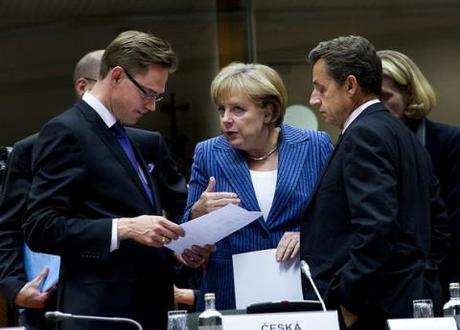
Angela Merkel (centre) and Nicolas Sarkozy (right). Photocredit: European Council http://www.flickr.com/photos/europeancouncil_meetings/5865957304/
After a few weeks of relative calm, the troubled eurozone has been plunged back into a state of crisis by a scary Friday the 13th which saw credit ratings agency Standard & Poor’s downgrade France and eight of the other 17 eurozone countries and the breakdown in crucial talks between private investors and Greek government about a voluntary participation in a debt write down. The downgrade left Germany as the only AAA-rated large economy backing the eurozone rescue fund and sent the economic commentariat into overdrive.
The toolkit is exhausted. Wolfgang Munchau of The Financial Times said that both events “are important because they show us the mechanism behind this year’s likely unfolding of events. The eurozone has fallen into a spiral of downgrades, falling economic output, rising debt and further downgrades. A recession has just started. Greece is now likely to default on most of its debts and may even have to leave the eurozone. When that happens, the spotlight will fall immediately on Portugal, and the next contagious round of downgrades will begin.” Munchau said that by downgrading France and Austria but not Germany and the Netherlands, Standard & Poor’s also “managed to shape expectations of the economic geography of an eventual break-up. A downgrading of all triple A rated members would have been much easier to deal with politically. Germany is now the only large country left with a triple A rating. The decision will make it harder for Germany to accept eurozone bonds. The ratings wedge between France and Germany will make the relationship even more unbalanced.” Munchau lamented that the wrong remedies to the eurozone crisis have repeatedly been taken, and concluded that, “the ultimate implication of last week’s ratings downgrades” is that “we have moved beyond the point where a technical fix would work. The toolkit is exhausted.”
Prolonged period of turmoil and stagnation. “Don’t blame the ratings agencies for the eurozone turmoil”, said Cambridge University economics teacher Ha-Joon Chang at The Guardian’s Comment is free. Chang accepted that France has “some grounds to be aggrieved” about losing its AAA rating, but insisted that “the eurozone countries need to realize that its Friday-the-13th misfortune was in no small part their own doing. First of all, the downgrading owes a lot to the austerity-driven downward adjustments that the core eurozone countries, especially Germany, have imposed upon the periphery economies.” Chang said that “even the breakdown in the Greek debt negotiation is partly due to past eurozone policy action. In the euro crisis talks last autumn, France took the lead in shooting down the German proposal that the holders of sovereign debts be forced to accept haircuts in a crisis. Having thus delegitimised the very idea of compulsory debt restructuring, the eurozone countries should not be surprised that many holders of Greek government papers are refusing to join a voluntary one.” Going forward, Chang saw little future for the eurozone without a radical rethink: “The eurozone, and more broadly Europe, is slowly strangling itself with a toxic mixture of austerity and a structurally flawed financial system. Without a radical rethink on the issues of budget deficit, sovereign bankruptcy and financial reform, the continent is doomed to a prolonged period of turmoil and stagnation.”
Bin the single currency. The “time has come to put the euro out of its misery”, boomed Leo McKinstry of The Daily Express, who said the eurozone “remains trapped in a terrifying downward spiral, dragging all the economies of the region further into indebtedness and unemployment.” McKinstry insisted that the “EU’s moans about the credit ratings system are pointless. The fact is that the downgrade is just a reflection of economic reality. The nations of Europe have been living beyond their means thanks to bloated public sectors, vast bureaucracies and huge welfare systems. The hour of reckoning has now arrived. Without radical change the crisis can only deepen as credit costs go up and debts worsen. The eurozone strategy of borrow and bailout is heading for catastrophe. A bankrupt system cannot escape collapse simply by piling up more debt. The whole euro project has failed on a spectacular scale bringing nothing but penury. By far the most logical step would be to put the wretched euro out of its misery and return the continent to the perfectly sensible monetary system that existed before 2001, where each nation had its own currency and could set its own interest rates”, recommended McKinistry. However, McKinstry doubted the euro will be scrapped due to the “fanaticism of the federalist politicians. The Western democracies used to abhor such communist dictators as Stalin and Chairman Mao, who inflicted mass suffering through their ideological fixations. But today the euro zealots have adopted a similarly unyielding approach. As a result the livelihoods of the European peoples are being sacrificed on the altar of political dogma.”
“As France reels from this savage blow to its prestige, Sarkozy’s chances of winning the forthcoming French presidential elections are looking dismal”, adjudged Leo McKinstry of The Daily Express.
Sarkozy on the rocks. Nicolas Sarkozy is “far from being a triple-A leader”, sniped Agnès Poirier at The Times, who said that although the French people take credit ratings agencies decisions with a pinch of salt, they see the president’s “erratic fiscal and economic policies since his election in 2007 are partly to blame for the country’s downgrade.” Poirier criticized Sarkozy’s constant flip-flopping on economic policy: “Sarkozy started off in 2007 by creating an intricate system of ‘fiscal niches’ for the wealthiest, generating a huge loss of revenue for the State. According to the latest reports, this fiscal measure alone has increased the public deficit by 20 per cent in just five years. He then went on to liberalise the economy, only to turn dirigiste a few months later when the first financial crisis hit us all.”

